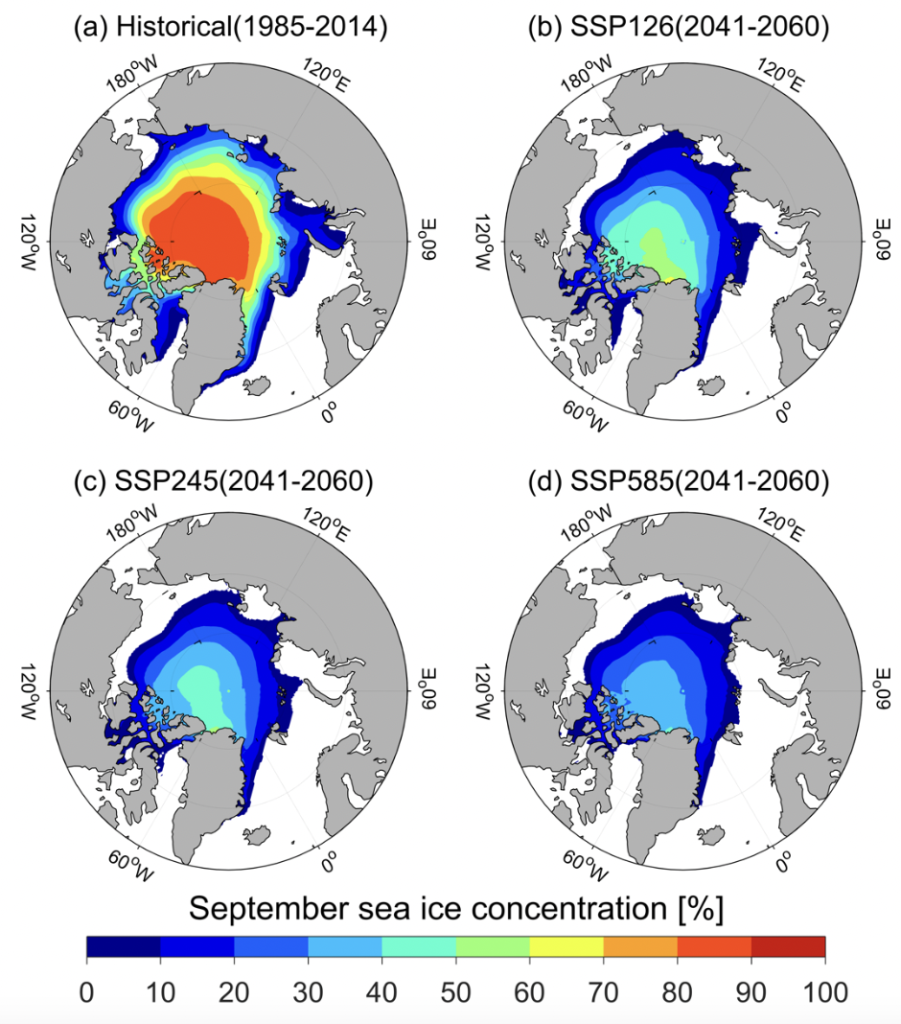
Mean September sea-ice concentration modeled over the 2041-2060 period under three emission scenarios in comparison with current ice concentration levels (1985-2014 period mean, top left). Depending on the selected scenario, the number of models used in the ensemble range from 27 to 29. Credit: Jim Overland
With the rapid decline of Arctic sea ice levels, there is a great need to understand impacts onset by these transformations amidst the shrinking timeline for necessary action. The Arctic Change Detection project at PMEL-University of Washington/ Cooperative Institute for Climate, Ocean, and Ecosystem Studies (CICOES) aims to address the impacts of sea ice disappearance on climate by leading the development of advanced model assessments to assess how sea ice/atmospheric interactions are affecting current and future climate predictions.
The project’s goals are divided into two objectives. The first is providing an up-to-date Arctic change detection activity for NOAA that includes recognition of rapidly emerging Arctic change and identification of localized and global impacts. This includes communicating these findings to NOAA and the wider community, including policy makers, fisheries managers, and the public. The second is to improve NOAA’s operational sea ice and weather forecasting capabilities, translating in-situ observations, and modeling climate impacts affecting ecosystems, communities, and infrastructure on multiple time-scales. These activities contribute to the safety and economic development in the Alaska maritime and coastal region.
Project Institution: Pacific Marine Environmental Laboratory (PMEL)
Partnerships: PMEL, University of Washington/Cooperative Institute for Climate, Ocean, & Ecosystem Studies (CICOES)
Award Period: 01 October 2021 – 30 September 2025
Data Access
2017 Heat Data Portal
2018 Heat Data Portal

Maximum (1980–2020) sea surface temperature anomaly (SSTA in °C), derived using the 95th percentile threshold
Featured Publication
Arctic Climate Extremes
October 13, 2022
Jim E. Overland
There are multiple extreme events underway in the Arctic that are beyond previous records: rain in Greenland, Alaska weather variability, and ecosystem reorganizations in the Barents and the northern Bering Sea associated with climate change and sea-ice loss. Such unique extreme events represent a philosophical challenge for interpretation, i.e., a lack of statistical basis, as well as important information for regional adaptation to climate change. These changes are affecting regional food security, human/wildlife health, cultural activities, and marine wildlife conservation. A way forward for adaptation to future extremes is through scenario/narrative approaches; a recent development in climate change policy is through decision making under deep uncertainty (DMDU).
Publications & References
Ballinger, T.J., and J.E. Overland (2022): The Alaskan Arctic regime shift since 2017: A harbinger of years to come. Polar. Sci., 32, 100841
Access Link
Ballinger, T.J., J.E. Overland, R.L. Thoman, M. Wang, M.A. Webster, L.N. Boisvert, C.L. Parker, U.S. Bhatt, B. Brettschneider, E. Hanna, I. Hanssen-Bauer, S.-J. Kim, and J.E. Walsh (2022): Surface air temperature, in State of the Climate in 2021, The Arctic. Bull. Am. Meteorol. Soc., 103(8), S264–S267
Download Link
Ballinger, T.J., J.E. Overland, M. Wang, U.S. Bhatt, B. Brettschneider, E. Hanna, I. Hanssen-Bauer, S.-J. Kim, R.L. Thoman, and J.E. Walsh (2021): Surface air temperature, in Arctic Report Card 2021. T. A. Moon, M. L. Druckenmiller, and R. L.Thoman (eds.), doi: 10.25923/53xd-9k68.
Access Link
Chylek, P., C. Folland, J.D. Klett, M. Wang, N. Hengartner, G. Lesins, and M.K. Dubey (2022): Annual mean Arctic Amplification 1970–2020: Observed and simulated by CMIP6 climate models. Geophys. Res. Lett., 49(13), e2022GL099371, doi: 10.1029/2022GL099371.
Access Link
Logerwell, L., M. Wang, et al. (2022), Potential habitat gain and loss for epibenthic invertebrates of the Chukchi and Bering Seas, 2008–2100 Deep Sea Research Part II Topical Studies in Oceanography, 206.
Download Link
Overland, J.E. (2022): Arctic climate extremes. Atmosphere, 13(10), 1670, doi: 10.3390/atmos13101670.
Access Link
Overland, J.E. (2021): Causes of the record-breaking Pacific Northwest heatwave, late June 2021. Atmosphere, 12(11), 1434, doi: 10.3390/atmos12111434
Access Link
Overland, J.E. (2021): Rare events in the Arctic. Clim. Change, 168, 27, doi: 10.1007/s10584-021-03238-2.
Access Link
Overland, J.E., and M. Wang (2022): Frequency of winter coupled North Pacific/North America circulation regimes. Climate, 10(4), 54, doi: 10.3390/cli10040054.
Access Link
Overland, J.E., B.-M. Kim, and Y. Tachibana (2021): Communicating Arctic-midlatitude weather and ecosystem connections: Direct observations and sources of intermittency. Environ. Res. Lett., 16, 105006, doi: 10.1088/1748-9326/ac25bc.
Access Link
Steele, M., H. Eicken, U. Bhatt, P. Bieniek, E. Blanchard-Wrigglesworth, H. Wiggins, B. Turner-Bogren, L. Hamilton, J. Little, F. Massonnet, W.N. Meier, J. Overland, M. Serreze, J. Stroeve, J. Walsh, and M. Wang (2021): Moving sea ice prediction forward via community intercomparison. Bull. Am. Meteorol. Soc., 102(12), Arctic Research Consortium of the United States (ARCUS), Sea Ice Prediction Network—Phase 2(SIPN2) January 2021 Workshop (virtual), January 21–22, 2021, E2226–E2228, doi: 10.1175/BAMS-D-21-0159.1.
Access Link
Wang, S., Q. Wang, M. Wang, G. Lohmann, and F. Qiao (2022): Arctic Ocean freshwater in CMIP6 coupled models. Earth’s Future, 10, e2022EF002878, doi: 10.1029/2022EF002878.
Access Link
Zhang, C., A.F. Levine, M. Wang, C. Gentemann, C.W. Mordy, E.D. Cokelet, P.A. Browne, Q. Yang, N. Lawrence-Slavas, C. Meinig, G. Smith, A. Chiodi, D. Zhang, P. Stabeno, W. Wang, H. Ren, A. Peterson, S.N. Figueroa, M. Steele, N.P. Barton, A. Huang, and H.-C. Shin (2022): Evaluation of surface conditions from operational forecasts using in situ saildrone observations in the Pacific Arctic. Mon. Weather Rev., 150(6), 1437–1455, doi: 10.1175/MWR-D-20-0379.1.
Access Link
AMAP 2021 Arctic Climate Change Update
Access Link
ICOADS Historical Weather Data
Access Link